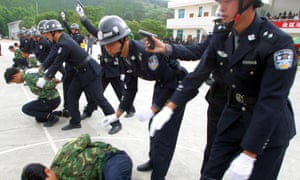The Guardian
Nicholas Bequelin, east Asia director, Amnesty International
Tuesday 8 December 2015 05.24 EST
■ Beijing is eroding key principles of international law by returning its citizens against their will to a country where they may face persecution
“Trust us.” In essence, this is the reassurance that Beijing offers to other governments when it wants individuals accused of crimes returned to China. Irrespective of actual evidence, China expects other countries to accept uncritically that the individuals sought are invariably “criminals”, who have violated Chinese law. And if anyone, including the UN, questions this, Beijing reacts angrily and calls it interference.
 |
| China evades questions about its record on torture, the lack of independence of its judiciary, or the fact that many of its laws violate universal human rights. Photograph: AP |
This scenario is playing out with increasing frequency around the world as Beijing slowly erodes one of international law’s key principles: the prohibition against returning people to a place where they could face persecution or other serious human rights violations. It evades questions about its record on torture, the lack of independence of its judiciary, or the fact that many Chinese laws violate fundamental universal human rights principles such as freedom of expression, movement or religion.
Last month, two Chinese pro-democracy activists, Dong Guangping and Jiang Yefei, were forcibly returned from Thailand, with the collusion of the authorities in Bangkok. The Thai government wilfully ignored the fact that the two men had been officially recognised as refugees by the UN’s refugee agency, the UNHCR, and had already been accepted for resettlement in Canada.
And make no mistake as to what the two activists have been sent back to: a country carrying out an unprecedented crackdown against human rights lawyers, government critics and NGOs. Hundreds of peaceful activists have been persecuted and thrown in jail after unfair trials since President Xi Jinping took power in late 2012.
A week after their forced return, Dong Guangping and Jiang Yefei were paraded on Chinese state television confessing to breaking immigration laws. Both men are criminally detained and at the mercy of a criminal justice system where torture and other ill-treatment to extract “confessions” remains widespread.
Their forcible return is part of a growing pattern, as China casts its net beyond its borders to round up critics and others that have sought sanctuary abroad. In itself this threatens, among other things, core principles on the protection of refugees, a bedrock of international law.
Many, like Thailand’s military rulers, but also the governments in Cambodia, Pakistan or central Asian countries, appear all too eager to help – in clear contravention of their own international obligations to protect those seeking refuge.
The Chinese government maintains that it is only seeking the return of suspected criminals, including terrorists and those wanted for corruption. But none of these claims should be taken at face value.
For example, while China has legitimate concerns about violence and terrorism in Xinjiang in the north-west of the country, the authorities have lost credibility by politicising and distorting the real nature of this threat. By systematically conflating concepts such as “separatism”, “extremism” and “terrorism” with non-violent activism, it is not only those who advocate violence who have become targets of the authorities’ harsh counter-terrorism policies. It is also peaceful critics of the repressive policies against ethnic Uighurs in Xinjiang that have become targets, most notably Uighur academic Ilham Tohti, who was sentenced to life imprisonment in September 2014 on trumped up charges of having set up a “separatist organisation”.
Earlier this year, the Thai authorities forcibly returned some 109 people, mostly Uighurs, to China – despite the serious risk of torture if sent back. Chinese state media said they were on their way to Iraq or Syria to “wage holy war”, yet provided no evidence to back up these accusations against a group that also counted many young children. Laos, Vietnam and Cambodia also appear to have forcibly sent back Uighurs to China. Once in Xinjiang, many of these individuals, like other Uighurs accused of terrorism and religious extremism, face enforced disappearances, lengthy detention and unfair trials behind closed doors.
The persecution of government critics is only likely to intensify as President Xi’s China pushes through a series of sweeping new laws and regulations on national security. China’s proposed anti-terrorism law, for instance, has virtually no safeguards to prevent those who peacefully practise their religion or simply criticise government policies from being persecuted under vague charges of terrorism or extremism. The definition of terrorism includes “thought, speech, or behaviour” aimed at “influencing national policy-making”, “subverting state power” or “splitting the country”.
And we should also remember that Xi’s flagship anti-corruption drive, which is also aimed at individuals abroad living off the proceeds of their crimes, is fundamentally a political campaign, with no independent judiciary to act as a safeguard. Most of the anti-corruption work takes place in the shadows, driven solely by the Chinese Communist party’s internal discipline machine, beyond any scrutiny. The campaign has also been marked by numerous suicides, regular show trials and unexplained deaths in detention. Beijing might call it justice, but most wouldn’t.
As China extends its crackdown beyond its borders, the international community must reject the Chinese authorities’ claims of “trust us”. No government should take China’s reassurances at face value. Instead they should ask difficult questions and ensure people receive the protection afforded to them under international law and are not sent back to be tortured and persecuted.
As for China, bringing its judicial system in line with international law and standards, starting with allowing lawyers to play a meaningful role in judicial proceedings and putting an end to the endemic torture of criminal suspects, would be a much more fruitful way to work towards the legitimate goal of increasing judicial cooperation with foreign governments.
China Aid Contacts
Rachel Ritchie, English Media Director
Cell: (432) 553-1080 | Office: 1+ (888) 889-7757 | Other: (432) 689-6985
Email: [email protected]
Website: www.chinaaid.org
